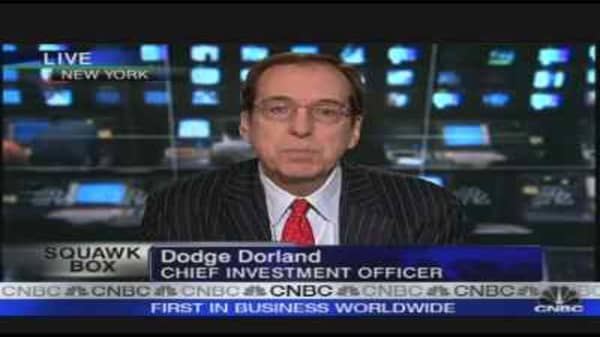Big banks topped this week's investing news as they continued to fight their way through the subprime mortgage mess. For some, like JPMorgan Chase and Citigroup , which both reported earnings this week, it meant
continued writedowns.
That was both a good and bad thing. While those writedowns meant, obviously, that bank portfolios and balance sheets were taking hits, they also raised hopes among traders that Wall Street was putting the worst of the credit crunch behind it.
(For a full rundown of the week's events and associated investment advice, watch the accompanying video).
JPMorgan Chase said Wednesday that quarterly profit fell by half, although shares rose as the third-largest bank avoided the kind of massive losses that crippled many of its rivals. The bank absorbed more than $5 billion of losses and write-downs tied to mortgages and broken-down corporate credit markets.
(Video: Richard Bove, Byron Wien and Jack Welch react to JPMorgan earnings)
Nevertheless those losses were less dramatic than those of rivals such as Citigroup, which posted its second straight quarterly loss, hurt by more than $16 billion of write-downs and costs related to credit losses, and said it will cut another 9,000 jobs.
Though the $5.11 billion first-quarter loss was larger than expected, analysts and investors expressed optimism that the largest U.S. bank and its new chief executive, Vikram Pandit, were taking necessary steps to move past credit problems and drive down costs.
Citigroup shares rose sharply Friday in reaction to the news.
Meanwhile, Merrill Lynch & Co. , the world's largest brokerage, also saw it's stock price rise Thursday in spite of saying it would cut another 3,000 jobs after more than $6.5 billion of fresh write-downs pushed it to a loss for the first quarter.
It marks the third straight quarterly loss for Merrill amid a global credit crisis that began last summer. Banks and brokerages have racked up nearly $200 billion of write-downs to date, with more feared to come.
(Video: David Katz of Matrix Asset Advisors dissects Merrill's steep Q1 loss)
John Thain, hired as chief executive four months ago to clean up the firm's books, cautioned that things were unlikely to improve in the next couple quarters. The New York-based brokerage lost about $2 billion during the most recent quarter, and has now written off about $29 billion worth of risky asset-backed securities and leveraged loans.
A Tale of Two Economies?
The week's economic data showed the pain from subprime is lingering in the economy as well.
U.S. producer prices advanced by a more-than-expected 1.1 percent in March after energy costs jumped, Labor Department data showed, but core inflation at the producer level was more subdued.
Consumer inflation pushed higher in March after remaining flat in the prior month. Overall prices rose 0.3 pct, while core inflation, which strips out volatile food and energy prices, rose 0.2 pct in March, in line with forecasts of economists polled by Thomson's IFR Markets.
Overall inflation is up an unadjusted 4.0 percent in the year ending in March, matching the 12 months through February, but slightly off the two-year high of January. Core inflation is up an unadjusted 2.4 percent over the last 12 months.
Jared Bernstein of the Economic Policy Institute said he finds some comfort in the CPI numbers, but warned CNBC's Steve Liesman that there's more to consider for consumers.
"If you look at 3-month annualized change, which in some ways the most relevant, up-to-date measure, the three-month annual core CPI is 2 percent right at Fed's," Bernstein said.
Where the Oil Plays Are
Oil broke through $115 a barrel this week after coming under pressure partly from a rise in the U.S. dollar and worries about a possible slowdown in China, the world's second-biggest energy consumer. (Video: Rep. Joe Barton talks about economic concerns of higher oil)
The decline of the U.S. dollar has made commodities priced in dollars easier to afford for holders of other currencies and made commodities attractive as a hedge against dollar depreciation.
Tradition Energy's Addison Armstrong said that Valero is the company to beat in the oil sector right now.
"They have ability to refine some of the lower grades of crude which, of course, are cheaper, so their margins, inherently are wider than everyone else, so Valero is a bit of a relative value play and I think that is what Barron's is talking about," Armstrong said.
Techs and Personal-Tech Wannabes
Individual companies made some interesting news as well this week. Blockbuster's billion dollar offer to buy electronic retailer Circuit City
raised some eyebrows.
Shares of Circuit City Stores Inc. faltered midweek as an analyst said a buyout by Blockbuster Inc. is unlikely, due to investors' concerns about the value of such a deal. The movie rental company made its billion-plus bid for Circuit City Monday — an amount that is larger than the Dallas video rental company's entire stock market value.
Richmond, Va.-based Circuit City dampened hopes of a deal, questioning Blockbuster's ability to finance such a transaction.
And in the tech sector, there were some significant highlights and surprises from the likes of Intel , IBM , eBay and Google .
So which tech darling is a strong bet for investors? Kim Caughey of Fort Pitt Capital Group thinks it's IBM.
"A lot of its revenues come from overseas and it also has alot of recurring revenue which means that's already business in the bag for them," Caughey said. "So I think looking forward it looks like things are going to be pretty good for IBM."
Merger Won't Send Stocks Flying
And finally, on Tuesday, the Delta-Northwest merger took flight. Delta Air Lines shares fell sharply again Wednesday as Wall Street took a cautious view of its acquisition of Northwest.
Delta and Northwest Airlines Inc. agreed to combine late Monday. If regulators and employee unions sign off on the deal, the companies will form the world's largest airline. But both stocks skidded Tuesday after the companies said they have no plans to cut back on flights.
But the airline industry continues to fight the rising price of fuel for profit. That's just one of the reasons why Dodge Dorland, CIO of Landor Investment Management, doesn't see the industry as an investing opportunity.
"There's very little positive with respect to the outlook for the industry and that's really causing concern from an investment point of view," Dorland said.
The proposed merger of Delta Air Lines Inc and Northwest Airlines Corp is likely to spur other carriers to go after the cost savings and global brand recognition required to survive amid soaring fuel prices and a weak U.S. economy.
If the long-awaited consolidation wave were, in fact, at hand, the airlines most likely to follow suit would be UAL Corp's United Airlines and Continental Airlines Inc , which reportedly have been in talks for months.





